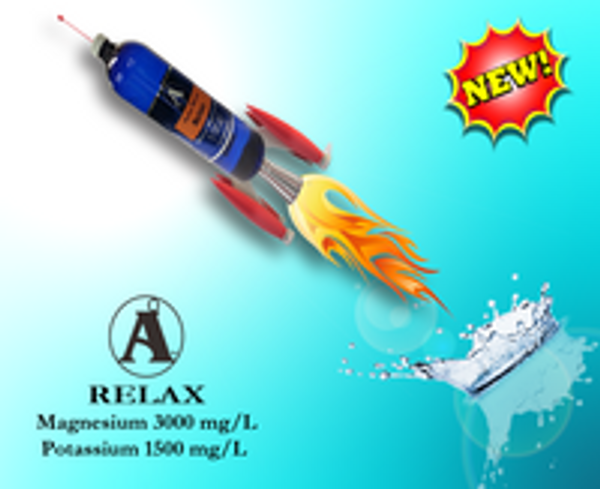Introducing Relax - Magnesium and Potassium in the same bottle.
Posted by Annette Hasalone, N.D. on 15th Feb 2014
Relax - Magnesium and Potassium in the same bottle!
Two of the most common minerals found in the cells of your body are magnesium and potassium. Both have very specific functions in your body and together they help maintain the correct balance of electrolytes and the proper functioning of the smooth and striated muscles. When these minerals are deficient your muscles can’t relax properly and cramping may occur.
Let us look at the properties of these two minerals in respect to your body’s biochemistry.
Magnesium is necessary to ensure the proper functioning of the sodium/potassium pump. While this is a complex topic, we will only look at the basics here. Magnesium is responsible for the movement of ions into and out of cells. Sodium and potassium are moved in opposite directions across the cell membrane, three sodium ions are pumped out for every two potassium brought into the cell.
This in important due to the nervous cells responsible for transmitting impulses responding to stimuli. When magnesium is deficient this activity is impaired and the sodium/potassium balance inside and out of the cells are out of balance. This, in turn, impairs the responsiveness of the nerve cells to stimuli. Both magnesium and potassium can be depleted by sweating, urination, stress, diuretic drugs and much more. It is important to get the proper levels of these minerals to help keep your body in balance.
The consequences of electrolytic imbalance are varied, some having potentially serious effects. Some can cause death if left untreated, although the symptoms usually let us know far in advance of the condition becoming fatal. Some of the consequences are:
The striated muscle fibers can become over-active which can lead to cramping in the calf and thigh muscles.
Cramping and pain in the smooth muscles of hollow organs like the uterus or bladder that can cause premature labor.
Spasms in the coronary blood vessels.
Calcium overload in heart cells that reduces use of oxygen and causes and overactive contraction of the heart muscle.
There are several heart problems caused by increased energy consumption, calcium overload and potassium deficiency. Cardiac ischemia and arrhythmia. Always remember that potassium is as dangerous in excessive dose as it is in deficiency, both can stop your heart if you aren’t careful.
What is good to know is even though this can create a self-perpetuating cycle, magnesium and potassium taken together can restore the correct balances across the cell membrane to improve function of the sodium/potassium pump and reduce the excess cellular calcium by replacing it with magnesium.
It works when both magnesium and potassium are taken together. Taking one or the other alone doesn’t work well. In emergency situations supplementation is good but immediate medical attention is required. To avoid the emergency room it is best to be preventative and have a regular supply of these two vital minerals.
The other properties that magnesium and potassium possess is the effect of magnesium in activating enzymes. Both of these minerals have a relaxing effect and both have essential parts to play in this regard. Magnesium and potassium can be used to relieve cramps and relax muscle tissue. They can relax excited smooth bronchial muscle tissue and are effective in relieving asthma attacks. Intravenous magnesium is a clinically proven treatment for acute asthma attacks.
Magnesium has been used for the treatment of muscle spasms and cramps and if used over a period of days can treat athletes with a history of muscle spasms. It is not only athletes that derive benefit from supplementing magnesium and potassium.
As mentioned before magnesium and potassium are lost through sweat and urination. This is not the only way magnesium is lost from the body cells. An invisible but vital way is the transfer of magnesium from the plasma into the red blood cells. The loss is proportionate to the amount of exercise (anaerobic exercise causes higher loss), therefore the need by athletes is higher than others. Magnesium and potassium can be lost rapidly through exercise (whether in the gym or running after the kids) with insufficient oxygen can cause the muscles to cramp up. This is an indicator that you are deficient in these two vital minerals.
Magnesium deficiency is common amongst Americans due to things such as high calcium intake, diuretics, alcohol intake, liver and kidney disease as well as insufficient dietary intake.
Potassium allows proper muscle contraction and relaxation and to maintain electrolytic balance in the body which includes the function of brain and nerve neurons. If your potassium levels drop by 50% death occurs.

